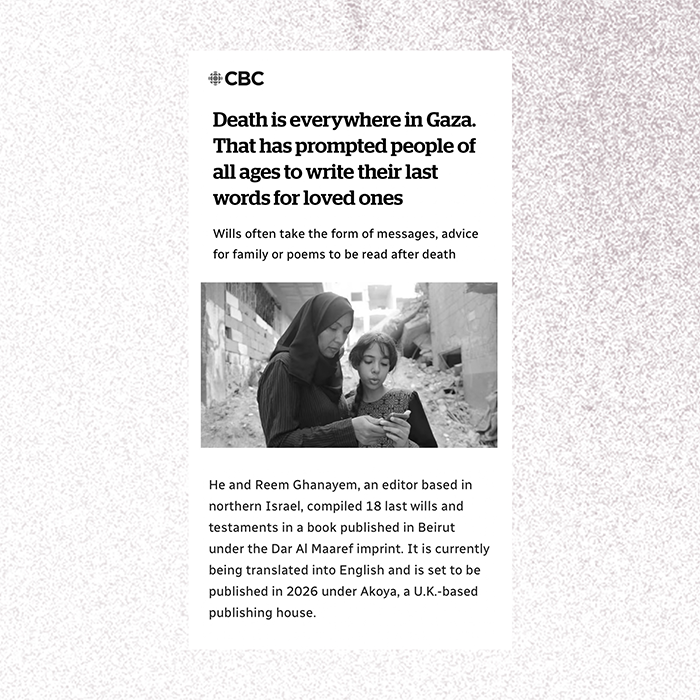CBC News features Reem Ghanayem's Book of Wills
“Before the war in Gaza, the Nasser Medical Complex in Khan Younis was a regularly functioning hospital. Patients would come in and their ailments would be handled by health-care staff. But in the last year, death has become omnipresent there, and now, funeral prayers are held almost every day in the hospital courtyard.
There is likely no one among the more than two million residents of Gaza who hasn't been touched by death in some way. Those on ground say they feel death has become a constant companion during their struggle to survive, a pervasive presence that has led some Palestinians to face their mortality by writing their wills.
These wills don't always take the conventional form of a legal document meant to split assets. Some write their wills as poems while others write about their feelings toward death, about their hopes and dreams and offer advice to those who survive.
Yousef al-Qidra, a poet and academic researcher, told CBC News freelance videographer Mohamed El Saife that his will — a simple paragraph — was written in a moment of panic after a nearby airstrike put him face to face with the possibility of death.
After the explosion, as the dust gathered around him, al-Qidra was faced with the uncertainty of the moment and worried about whether he would live or die. It caused him to reach for his phone and frantically type out a text message.
"After survival, the responsibility lies in rebuilding what has been torn down. To create new lives lit by the smiles of children, surrounded by the lights of love and mercy," he wrote.
"In this vision, I see myself shining as a child clinging to life for eternity."
The phenomenon of war-time wills has become so widespread in Gaza that it caught the attention of Hani Al Telfah, a publisher currently in Turkey.
He and Reem Ghanayem, an editor based in northern Israel, compiled 18 last wills and testaments in a book published in Beirut under the Dar Al Maaref imprint. It is currently being translated into English and is set to be published in 2026 under Akoya, a U.K.-based publishing house.
"This book isn't just for reading, it's a book for history," said Al Telfah. "It's important for the words in this book to stay alive."
Three of the contributors to the book and the family of one who died in December 2023 spoke to CBC freelance videographer Mohamed El Saife about the moments that triggered them to write their wills, as well as their thoughts on death, how they've faced it and survived during the last year of war.
Read the remainder of the article can be read on CBC's website.
Article appears as written in CBC News on 13/10/2024.
 Image from CBC NEWS | Oct 2024
Image from CBC NEWS | Oct 2024